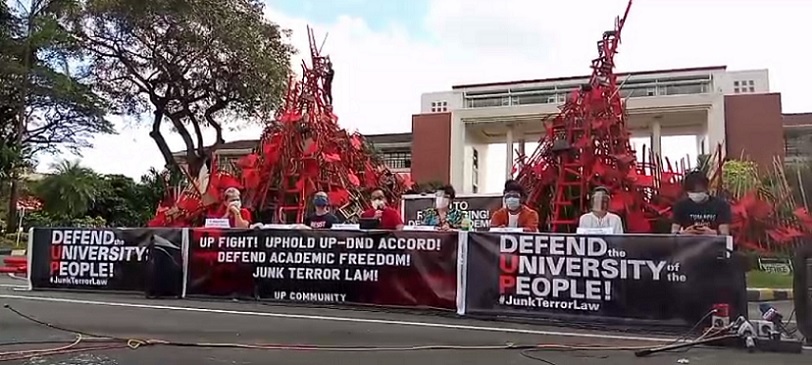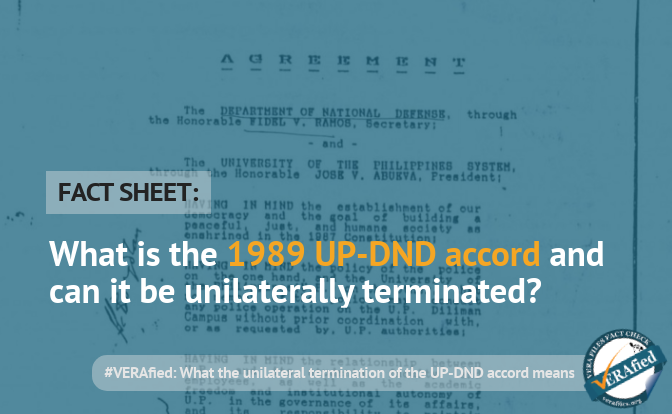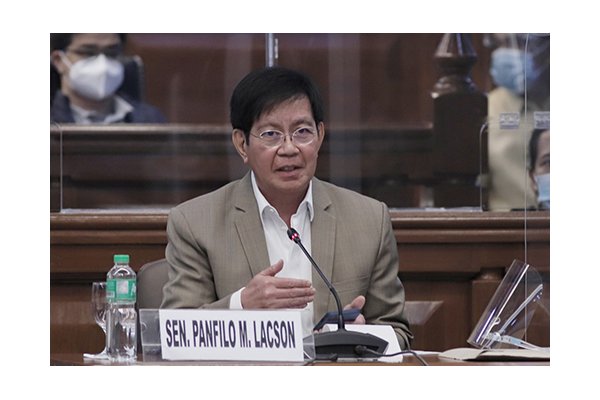
Members of the University of the Philippines Rises Against
Tyranny and Dictatorship (UP RISE) and UP leaders stand in front of an art
installation protesting against campus militarization. Screengrab from the UP
RISE Facebook page.
Leaders of the University of the Philippines (UP) community vowed on Tuesday, Jan. 26, to resist the government’s efforts to militarize their campuses and keep fighting for academic and democratic freedoms inside and outside the country’s premier university.
They spoke in a press conference in front of the UP-Diliman administration building, condemning Defense Secretary Delfin Lorenzana’s unilateral abrogation of the 1989 agreement between the Department of National Defense (DND) and UP, which prevented state forces from entering and conducting operations inside its campuses without prior notification, as well as the subsequent red-tagging of 28 UP alumni.
Lorenzana has considered terminating also the DND’s similar agreement with Polytechnic University of the Philippines (PUP).
Activist groups in UP have lined up a series of protest activities, one of which is a rally on Jan. 28 to coincide with the Board of Regents’ meeting during which the termination of the DND-UP security accord will be discussed.
“Hindi tayo papayag na papasukin tayo ng AFP [Armed Forces of the Philippines], ng PNP [Philippine National Police], o ng mismong si Duterte … Hindi ito ang panahon para matakot. Ito ang panahon para tumindig (We won’t allow the AFP, the PNP, or even Duterte to enter our university. This is not the time to be afraid. This is the time to stand up),” Anakbayan leader AJ Lagrimas said during the press conference carried on the Facebook page of UP Rises Against Tyranny and Dictatorship.
Professor Gerry Lanuza called on the UP alumni to stop the military from getting a hold of the university and to keep fighting for academic and democratic freedoms. He warned that giving an inch of campus territory to the military can lead to a large-scale control not only of the university but also of their constitutionally guaranteed freedoms.
“Si Oble (referring to the UP Oblation) ay hindi nakaluhod; siya ay nakatayo. Mas mabuting lumalaban na nakatayo, mamatay nang nakatayo, kaysa tayo ay buhay pero nakaluhod, begging for freedom (The Oblation is not kneeling; it is standing. It’s better to fight standing, die standing, than to be alive and begging for freedom),” Lanuza said.
Remember history to fight for the present
Associate journalism professor Danilo Arao reminded the public that it is important to remember the past to understand what the present fight is for.
“Sa okasyong ito, malinaw na tandaan natin ang konteksto ng nakaraan para alam natin kung ano ang dapat nating ipaglaban para po sa kabutihan ng mas malawak na mamamayan (On this occasion, let’s clearly remember the context of the past so that we know what we should fight for the good of the general public),” Arao said.
He recalled that the UP-DND accord came about as a consequence of the widespread human rights violations in the 1980s, which carry over to current events such as extrajudicial killings and the war on drugs.
For him, the fight for academic freedom and safe spaces in the campus is already beyond the call to maintain the unilaterally terminated accord.
“Suportahan natin ang mga inisyatiba sa Kongreso para ma-institutionalize ‘yung ganitong klaseng kasunduan sa buong Pilipinas (Let’s support initiatives in Congress to institutionalize this type of agreements in the entire Philippines),” he said.
A dangerous precedent
On Saturday, Jan. 24, Lt. Gen. Antonio Parlade, spokesperson of the National Task Force to End Local Communist and Armed Conflict, tagged 18 Philippine universities as “recruitment grounds” for fighters of the New People’s Army (NPA), the armed wing of the Communist Party of the Philippines (CPP).
During the press conference, Lanuza mused about the possible effects of the termination of the DND-UP accord to him and his students, which may also happen in other universities if left unchecked.
“Ang masama rito, hindi ka pa nagsasalita, hindi ka pa nagtuturo … ang gobyernong ito binubusalalan ka na (The bad thing is, even before you speak, before you teach … this government is already gagging you),” Lanuza said.
He added that he is afraid for his students who might be arrested for doing room-to-room socialism lectures during online classes and sharing announcements about upcoming protest actions.
As a sociology professor, he said he might also be tagged as a communist if he uses academic references pertaining to socialism.
“’Pag pumunta ako sa conference at ginamit ko si Marx, pupuntahan ba nila ako sa conference, babasahin ang aking papel at ako’y poposasan at sasabihang ‘komunista ka, nag-re-recruit ka dito (If I join a conference and use Marx, will they go to the conference, read my papers, cuff my hands and say ‘you’re a communist, you’re recruiting here’),” he wondered.
AFP apology
The Armed Forces apologized to the UP alumni who were falsely tagged as deceased or captured members of the NPA after Lorenzana said he did not know how the military came up with such a list.
The apology was posted in the Facebook page of the AFP Information Exchange.
“We sincerely apologize for those who were inadvertently affected by inconsistencies regarding the List of Students who joined the NPA (Died or Captured) that was posted in the AFP Information Exchange Facebook account. That article has since been immediately taken down or deleted from our social media accounts,” it said.
“The Office of the J7, AFP is already conducting an internal investigation as to how the list got published. Personnel who are responsible will be held to account.
We want to assure the public that we are now reviewing our processes and procedures to ensure that similar incident will not happen again in the future.
The Office of J7, AFP remains committed to providing and disseminating information on social media platforms that will contribute to a better Philippines for all,” the statement added.
J7 refers to the Civil-Military Operations Office in the AFP.

